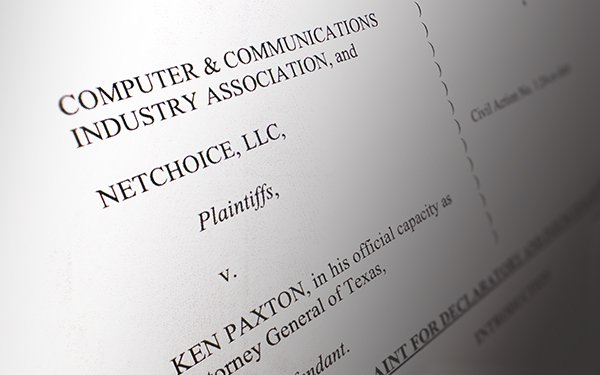
A new Texas law that prohibits social media
platforms from serving “harmful” content to minors violates the First Amendment, the tech industry groups NetChoice and Computer & Communications Industry Association allege in a new
lawsuit.
“Texas has enacted a law targeting disfavored online publishers and their dissemination of protected, valuable expression online,” the groups write in a complaint filed this week in U.S. District Court in Austin.
They are seeking an injunction
prohibiting Texas from enforcing key provisions of the Securing Children Online through Parental Empowerment Act (HB 18). The bill was passed last
year, and the provisions at issue are slated to take effect Sep. 1.
advertisement
advertisement
The law requires social platforms to use filtering technology to screen out content deemed harmful by state lawmakers --
including material that facilitates eating disorders, self-harm, substance abuse, and “grooming ... or other sexual exploitation or abuse.”
The statute also requires social
platforms to verify users' ages, and allow parents to access accounts of children under 18.
The tech organizations argue that the restrictions violate the First Amendment's prohibition on
censorship, and are inconsistent with Section 230 of the Communications Decency Act, which protects web publishers from liability for material posted by users.
“The Act will impose
large, speech-chilling burdens on covered websites -- including Facebook, Instagram, Nextdoor, Pinterest, Snapchat, X, and YouTube,” the groups write. “These websites will be required to
monitor for and censor content- and viewpoint-based categories of speech.”
The First Amendment generally protects all lawful speech, including material dealing with drug use, eating
disorders and suicide.
The organizations add that the law's definition of “harmful” content covers a wide range of material -- including “political speech, critically lauded
works of fiction, and everyday interpersonal communications.”
For example, content dealing with suicide or self-harm can be found in works such as Shakespeare's “Romeo and
Juliet,” Sylvia Plath's “The Bell Jar” and the television show “13 Reasons Why,” the tech groups write.
Texas isn't the only state to attempt to regulate how
social platforms serve content to minors.
Lawmakers in Arkansas, Utah, Ohio, Mississippi, New York and California have also passed restrictions affecting teens' use of social media.
NetChoice has successfully sued to block enforcement of the measures in California, Arkansas, Ohio and Mississippi.